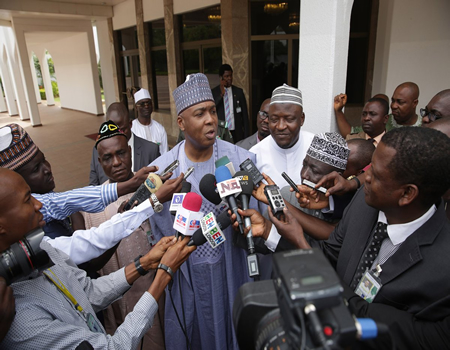AGAINST the backdrop of the apparent face-off between the executive and the National Assembly, Senate President Bukola Saraki and the Speaker of the House of Representatives, Yakubu Dogara, on Monday, met with President Muhammadu Buhari at the Presidential Villa, Abuja, with Saraki assuring that there was no cause for the alarm over their relationship.
It will be recalled that the Senate had refused to confirm Ibrahim Magu as the substantive chairman of the Economic and Financial Crimes Commission (EFCC) even as it seemed that the executive was insistent on him being the man for the job.
The Senate had also declined to consider the nominees for Resident Electoral Commissioners (RECs) because of its perception of being disregarded by the Secretary to Government of the Federation (SGF), babachir lawal, and the Comptroller-General of Customs, Hameed Ali.
The Federal Government, last week, set up a committee, headed by Vice President Yemi Osinbajo, in a bid to smoothen the frosty relationship while the All Progressives Congress (APC) leadership had also scheduled a meeting with its Senate caucus.
Speaking after a closed-door meeting with the president, Saraki told State House correspondents that despite what might be taking place between the two arms of government, their relationship remained cordial.
“These are things that happen on the part of democracy, but I can reassure Nigerians that it is just a drop in the ocean. It is not an issue that should stir the whole nation; rest assured.
“Some of these other issues will happen, but I don’t think it is a major issue, but we are still moving ahead and still consulting,” Saraki stated.
Noting that his meeting with the president was routine, Saraki declined to address the issue of the suspended screening of RECs, saying that he discussed more important issues with the president.
“We talked also about the INEC bill that we have passed. I took the president through some of the areas, very important areas, because you know the president, over many years, is somebody that has gone to many elections. So, that was something he was really excited about.
“Some of the new amendments like electronic voting, talks about electronic process for collation, those are landmark achievements that we hope that very soon, the House will concur and we all come here for the president to assent.”
He described the Osinbajo-led committee as a good initiative, as he noted that there would always be issues of contention.
He added: “Good development, but like I said, there will always be issues on one or two things. It does not mean that is the foundation of it.
“When you have an arm of government that has to do with confirmation there will always be. For example, the NDDC bill we rejected three people from NDDC, we keep on moving, we are all part of one government.
“That is why despite all these, major decisions are taken. Like I said, we did a critical amendment on INEC on Tuesday or Wednesday for the first time in the history of the legislature.
“We are going to lay a report on the PIB for consideration. It has never happened for the past 20 years. It has not got to this stage.
“So, it is work in progress and in the interest of Nigeria. Don’t let us get distracted by one or two infractions, its bound to happen. “
Buttressing his argument on the cordial relationship, Saraki further said: “It is cordial, you cannot examine it based on NDDC, based on EFCC. We have other issues. We have ministerial nominees that we are going to be working on.
“We have the budget that is more important, we have INEC, PIB, we have so many important things and I think it’s a mixture of all. That should guide us. Don’t let us overheat on some of these issues.”
On the recent suspension of Senator Mohammed Ndume, the Senate President said it should be seen a the collective decision of the Senate, even though he maintained that no law was rigid.
Also speaking with State House correspondents after a separate meeting with President Buhari, Dogara observed that crisis was a vital ingredient of democracy.
He said what was seen as crisis between the executive and the legislature was good for democracy, saying: “You see, the point is, we should never run away from crisis. Crises are always wonderful opportunities for us to begin anew, for us to set new boundaries, for us to begin to examine things in a new way.
“So, we should welcome crisis. They are the engines that always propel growth and progress.
“So, if anyone thinks he has issues with the National Assembly, let him come and we will have the opportunity to explain. That is the beauty of democracy.”
Commenting on the planned protest at the National Assembly by some groups this week, he said people were free to express their views, adding that it was the responsibility of the elected representatives to explain to them.
“This is a democracy we are running and we have to open the space to civil society, to everyone who feels aggrieved to be able to air his grievances.
“So, if they have grievances against the institution of the legislature, we will take it.
“You might look at it as crisis but I don’t look at it as crisis. You know, I have always said this, that as a government, our value will be the problems we have solved,” he said.
“We can’t be remembered for avoiding. We can’t be remembered for running away from problems. It is only when? we provide solution to some of the things you refer to as crisis and we look at it as opportunities to begin anew that people will now remember us for putting down enduring legacies.
“But when we run away from everything that appears to be trouble, we will not make it.”




